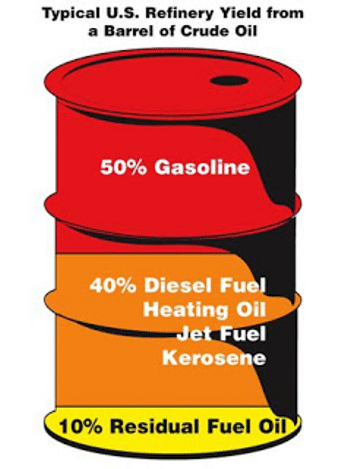The Electric Future of Gasoline
We are told that electric automobiles are the future. Currently coal, oil or gas are the source of energy for most electricity. Only about a third of the energy in the source is converted to electricity. There are also significant losses in the transmission of electricity and in charging the vehicle’s battery. Gasoline powered vehicles are also inefficient, with again only around one third of the source energy being available to move the vehicle.
So at first glance there seems to be little, if any, advantage to using electricity for transport. However, proponents of electric vehicles argue that the required electricity will soon be produced by renewables such as wind or solar. Many seem to think that “renewable” energy is free. It is not. For example, read about the true cost of wind power here.
But widespread adoption of electric vehicles would cause another, more serious problem. About half a barrel of refined crude oil is gasoline. The only use for gasoline is small, internal combustion engines. If these engines are replaced by electric power, what will be the future for gasoline?
If it is burnt off or otherwise disposed of, pollution will become an issue and other products such as diesel will become much more expensive. Alternatively, it could be used to produce electricity, which would also be polluting and less efficient. In either case, it would rather negate the point of electric vehicles.
The first electric auto was built in 1837. The problems then – short range and long recharge times – still exist today. Widespread use of electric vehicles would result in more pollution and less efficient energy use. I don’t see the logic.
Image Courtesy Dmitri Orlov

